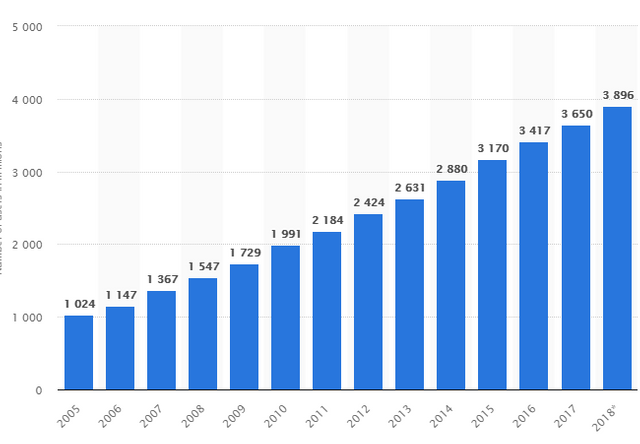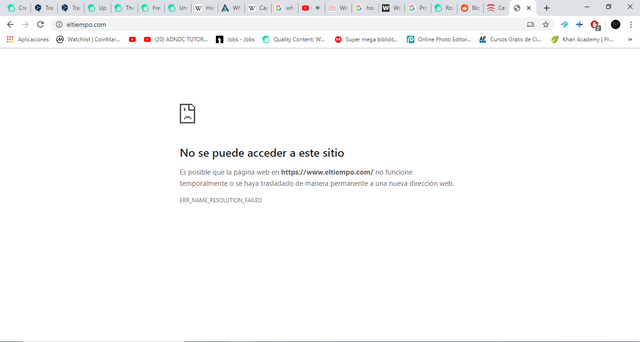Is the internet really being what it's supposed to be?
The internet is a globally connected network system that uses TCP/IP to transmit data via various types of media. The internet is a network of global exchanges – including private, public, business, academic and government networks – connected by guided, wireless and fiber-optic technologies. Source: What does Internet mean? - Techopedia.
Hi! First of all I want to say that this post is part of a contest organized by @upmewhale, you can take part of the contest (althought it's a little late to do so), you can take a look here: https://steemit.com/self-power/@upmewhale/upmewhale-writing-contest-restricted-and-unrestricted-internet-freedom-world. Thank you @upmewhale for the contest!
What is the Internet?
We can call internet to any conexion between computers or any dispositive capable of connecting with others, simple, right? Well, other thing is the Internet (as far as I know). In this post I'll talk about the second term
the Internet is the largest network in the world, there are billions of devices connected to the network, its reach is completely global and more than half the people in the world use the Internet, Asia being the continent with the most people.
Do you want to see statistics? Look
 Number of internet users worldwide from 2005 to 2018 (in millions). Source: statista.com
Number of internet users worldwide from 2005 to 2018 (in millions). Source: statista.com
Continents using more internet in 2019. Source: internetworldstats.com
Ok, the Internet is something veeery big, I think it's clear now.
The Internet was created to be a place where anyone could communicate with another person in another part of the world without restrictions, being something like a channel capable to give people a way to meet a new world full of new info and new opportunities, having a tool that gives you any information you need is simply amazing. Now just imagine being able to access sites or meet people on the other side of the world without any restrictions, that's how incredible the Internet is. But the internet isn't being this.
Restrictions = Lack of freedom
The problems begin with countries and governments radically changing their laws to regulate the Internet in a certain way, making companies that use the Internet have to change their ways of operating and finally affecting the people who consume this. This is bad and too serious, it has gone unnoticed between us and now we are paying the consequences (and worst of all: We don't seem to care)
An example of this are the continuous changes in one of the biggest websites in the Internet: Youtube.com (website I'm using right now)
YouTube is a place where anyone can upload content and give their opinion about any topic they want, it was like this in the beginning, but how Youtube works in 2019? I'll give you a short list about things you can't do in YouTube (or well, if you want to be a little recognized on the platform you shouldn't):
- You can't say rude things.
- You can't be rude in any way
- You can't upload political content
- Oh sh*t, YouTube sucks.
These restrictions are on a global level, there is also content that you can not see if you are from x country, which I'm not so sure of why it is so, but neither is good.
Anyway this post isn't about a list of the problems of YouTube, but as you can see, there are censorship/restrictions and that's not good, the Internet wasn't created for that.
Ok, let's get into my country: How the Internet works in my country? (Venezuela)
Restrictions in my country are TOO common, it's scary how many websites are restricted by the government of my country, at first it was supposed to be for political reasons, but, now it seems that they just do it because yes.
I'll give you an example and some context: Isn't a secret that Venezuela is a country in a very very bad state, the quality of life here is incredibly low and the government does nothing to fix it (or, at least what they try to do something it simply fails or is useless).
There are economic problems due to several factors, I say it is simply because of the hyperinflation generated in the country and the rest of things are attempts to divert attention from inflation (if you can justify the existence of free money that the government give you for simply existing, I will assume that there are other factors). The government wants to make believe that the price of the dollar (American Dollar, USD) with respect to the bolivar (BSS) is one of the reasons why the country is in a bad situation, saying that the platforms that dictate the price of the dollar (pages that are based on the price that people dictate, ironic) are to blame for the fact that the economy being so bad.
I don't deny the fact that these platforms are very susceptible to manipulation, so I give the government the benefit of the doubt.
What was the quickest and easiest solution?
Block those pages, restricting access to them and thus the problems would end (it did not work, it is obvious), but ok, as I said before, these webpages are susceptible to manipulation and perhaps it is not entirely healthy for our economy to access them (although we can still visualize them by entering other pages like Twitter haha)
But problems (or at least what I consider problems) start when they start restricting because they want to and can do it, for example: https://www.eltiempo.com/ It's the website of a Colombian newscast, why would they restrict it?

Screenshot taken from my laptop if I try to access to the website without VPN. There are 20 tabs in my browser, in case you wanted to know
Let's go to more extreme examples: Spotify
Oh god, why you should restrict Spotify? Spotify has nothing to do with politics, it's just a platform for listening to music. Examples like this are many, a funny one is: xvideos, yup, xvideos is restricted in our country
And that's how the question I put as the title of the post is born: Is the internet really being what it's supposed to be?
In my opinion: No, the Internet isn't being what it's supposed to be.
The reason? We.
In our country restrictions are something we have let happen without any problem, I would say we welcomed them and now we are paying the consequences. I don't want to imagine an Internet where we have to avoid restrictions in one way or another, that's not freedom.
One of our salvations (I hope it is not the only one) is the blockchain technology, it has already shown that it can be completely decentralized and although it has a long way to go (I mean, blockchain technology is simply a child compared to the Internet), for now it is an effective solution and in which I have great confidence.
What do you think? I'm interested in how restrictions work in your country (if any)
Thanks @upmewhale for the contest (again)!
Edit: Off-topic, this article was created while listening to this incredible piano piece, you could enjoy it while you read the post: